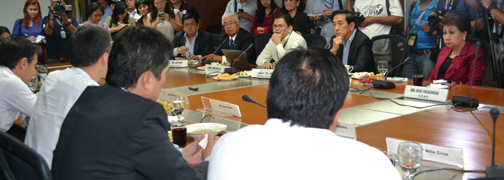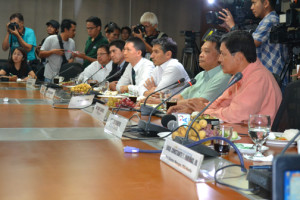

For the next 15 days starting March 8, Philippine importers, exporters, the Bureau of Customs (BOC) and government banks Land Bank and Development Bank of the Philippines will extend their operations to reduce the backlog of cargoes that resulted from Manila’s daytime truck ban.
The short-term solution was among measures proposed by stakeholders and industries affected by the truck ban in a press conference called Tuesday by the Philippine Ports Authority (PPA). The conference was attended by officials of the BOC, Manila port’s operators International Container Terminal Services Inc. (ICTSI) and Asian Terminals Inc. (ATI), the Philippine Chamber of Commerce and Industry (PCCI), Land Bank of the Philippines (Landbank), Development Bank of the Philippines (DBP), Confederation of Truckers Association of the Philippines (CTAP), and Philippine Exporters Confederation Inc. (Philexport).
PPA general manager Juan C. Sta. Ana said traders, represented by the Philippine Exporters Confederation and the Philippine Chamber of Commerce and Industry, agreed to open their warehouses at night to accommodate trucks.

The Manila International Container Terminal, the country’s biggest terminal, on the other hand, is already operating practically on a 24/7 basis since 1988.
Participants to the press conference acknowledged that the long-term solution to the congestion problem is infrastructure that will link the ports to North and South Luzon expressways.
Meanwhile, an exclusive lane for cargo trucks open 24 hours a day, seven days a week was again proposed during the meeting.
CTAP director Alberto Suansing said truckers are not asking for all roads to be opened, just a lane on A. Bonifacio Drive in Port Area, Road 10, Circumferential Road 3, Fifth Avenue and Sgt. Rivera for north-bound cargoes, which make up 30% of total cargoes going through the Manila ports; and a lane for south-bound trucks, as well as a lane on Roxas Blvd. specifically for trucks bound for Cavite.
The CTAP official said some truckers may have started imposing a road congestion surcharge of not less than 50% of the usual rate on their customers.
Customs Commissioner John Sevilla said his agency’s revenues have also suffered from the truck ban. “Customs collection is down by P100 million to P150 million a day. The whole economy is suffering because of this.”
Christian Gonzalez, general manager of ICTSI’s flagship port MICT, noted the need “to balance the desire to limit the impact of traffic and the continued growth of the economy.”
He pointed out the average daily volume of import cargo at MICT is 3,800 20-foot equivalent units, which cannot be distributed in the operation window given by the Manila city government.
“The only way to do that is to spread the flow of goods over 24 hours. It has always been our position at ICTSI that the solution is proper road infrastructure. The Department of Public Works and Highways has already been very serious in getting projects started that will alleviate traffic. Unfortunately, it’s going to take three to four years to get these done.”
Gonzalez also suggested an “appointment system” for trucks, citing the port of Hong Kong as an example.
He noted the appointment system is already being done by some of the 6,000 trucks that deliver cargoes in and out of Manila.
As for shifting cargoes to Batangas or Subic, he said the cargoes will just return to Metro Manila because it is where consumption is.
The PPA said port operations are normalizing, but Gonzalez said “it’s just a matter of time” before the port gets congested again if the situation continues.
Constante Fariñas, PPA port district operator, said the port agency has opened an area for about 500 trucks in PPA’s jurisdiction while the Manila International Container Port has room for 600, South Harbor has 250 and North Harbor, 150.
Electronics industry
Meanwhile, about 10 members of the Semiconductors and Electronics Industries in the Philippines, Inc (SEIPI) — or 8% of the association’s total membership — are “seriously considering” shifting to Batangas port as a solution to the congestion problem, Association of SEIPI Logistics Managers chair Malou Ronquillo told PortCalls in a text message.
“We have members who were hit hard. The delay in deliveries of parts caused assembly line shutdown, consequenty affecting commitments to customers, some of which already placed new orders with Vietnam and China,” Ronquillo added. –– Roumina M. Pablo, Mitch Valcos, Trish Yap




